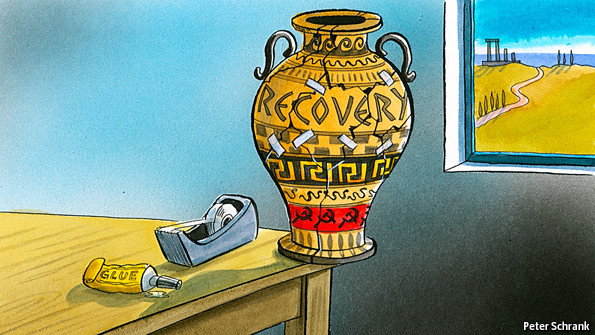KALI chronia: happy new year. Greece starts 2014 with an unaccustomed run of good news. Not long ago the country was in a death spiral of missed fiscal targets, panicked markets and threats to force it out of the euro. Now the euro zone’s first and most difficult problem child is exceeding expectations.
Ahead of schedule, Greece has closed its scary deficit and moved into primary budget surplus (ie, before interest payments). Yields on ten-year bonds have fallen below 8%, from a peak of well over 40% at the height of the Grexit panic. The government plans to issue fresh debt later this year. Some foreign investors are testing the waters of the Aegean. Competitiveness is being restored. Greece has enjoyed a bumper tourist season. This year should see the first GDP growth after six years of recession.
Once-exasperated German officials now hail the Greek prime minister, Antonis Samaras, as the saviour of his country—and, indeed, of the euro. As Greece assumed the half-yearly rotating presidency of the European Union this month, EU dignitaries came to Athens this week to praise it, not to bury it.
Official rejoicing over the Greek bail-out programme is understandable. And yet Greece remains troubling, economically and politically. It has lost a quarter of economic output since 2007, thanks largely to the errors of its rulers and creditors alike. More than a quarter of its workers are jobless. Soup kitchens are commonplace, as are empty buildings and shops. Unit-labour costs have been reduced by cutting wages, not raising productivity.
Stripping out the murky trade in fuel, and volatile tourism revenues (up in part because of turmoil in Egypt and Tunisia), Greece’s exports are falling. This is alarming. In Spain, Portugal and Ireland lower labour costs have boosted exports. Some Greeks blame a lack of credit. Others note that the country’s main export market, the EU, has been in recession. But the real problem is an economy that produces few tradable goods. Cheaper workers make little difference if there are no factories to hire them. If growth picks up, Greece may just suck in imports, restarting the cycle of external imbalances that proved its undoing.
The economy needs profound structural reforms. But here the record has been far less impressive than on fiscal adjustment. Mr Samaras’s lieutenants deny charges of foot-dragging, offering a long list of measures, from improving tax-collection to rationalising health spending to opening up cosseted professions. More will come, they say, including an assault on the myriad regulations that clog up product markets.
True, Greece has shot up the World Bank’s ranks for the ease of starting firms. But in the wider measure of ease of doing business, it ranks 72nd in the world, behind Azerbaijan, Kyrgyzstan, Belarus and Kazakhstan. Obtaining planning permits is maddening. And the judicial system remains slow and quixotic.
Indeed, the country’s biggest problem, say many despairing Greeks, is a dysfunctional state. Mr Samaras, more or less untainted by past mismanagement, retains an old-style penchant for clientelism. Yet impunity may be cracking a bit. A former defence minister is in jail for corruption. The café talk is of a senior defence official who told investigators he received so many bribes he could not remember them all; and of an ex-minister, a nephew of the venerated Constantine Karamanlis, the pre-and post-junta prime minister, hauled up before the courts for driving a car with fake number-plates. But serving politicians do not feel the heat and prosecution of big tax-dodgers remains a rarity. What to make of a bizarre judicial investigation of the man appointed to reform the unreliable statistics office, now accused of corruption for supposedly exaggerating Greece’s fiscal hole?
Restructuring an economy and reinventing the state take time and determination. But Mr Samaras, even if he were the man for such a task, is running out of both. Syriza, the radical left-wing coalition, is leading the polls for May’s European election. Its telegenic and wily leader, Alexis Tsipras, is even a pan-European candidate to become president of the European Commission.
That will never happen. But a victory by Mr Tsipras in the election could undermine Mr Samaras’s fragile coalition, particularly as members of his Socialist allies, Pasok, defect to Syriza. By mid-2015, the EU could conceivably be dealing with Mr Tsipras as prime minister, or at least kingmaker. Scenting power, he has started to take English lessons and to travel. Abroad, Mr Tsipras’s message is that he does not want to leave the euro; at home he promises to renege on the memorandum with Greece’s creditors. Even Syriza’s more level-headed members cannot say precisely how they could ditch the conditions and keep the loans.
Politics is a Greek word
Mr Tsipras might yet turn out to be more pragmatic than his rhetoric. Some already liken him to the late Andreas Papandreou, Pasok’s founder, or to Mr Samaras himself, who also once opposed the memorandum. Even without the bank runs that some predict would follow a Syriza victory, Mr Tsipras’s pledge to undo many reforms and renationalise the few privatised firms would, at the least, kill off any incipient recovery.
A worried Germany could yet ease demands for structural reforms to take the pressure off Mr Samaras. But a better move would be to make a clear early commitment that the euro zone will honour its semi-promise in 2012 to give Greece additional debt relief, through lower interest rates and longer maturities, now that it has reached a primary surplus. In exchange, creditors should focus not on more austerity, but on the need to reform the economy and the state. The biggest risk in Greece is now political, not financial. Fears of default and Grexit have receded; the worry is rather about the rise of Greek extremists of both neo-Stalinist and neo-Nazi varieties.









